|
|
|
Sort Order |
|
|
|
Items / Page
|
|
|
|
|
|
|
| Srl | Item |
| 1 |
ID:
192519
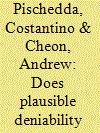

|
|
|
|
|
| Summary/Abstract |
States conduct unclaimed coercive acts, imposing costs on adversaries to signal resolve but denying (or not claiming) responsibility. Some scholars posit that unclaimed acts have considerable potential to coerce targets, while containing escalation risks. Others suggest that unclaimed coercive efforts tend to fail and trigger escalation. We assess these competing perspectives about the effects of unclaimed attacks with a vignette experiment exposing US-based respondents to a scenario where, after Russia warns of unpredictable consequences if NATO continues providing weapons to Ukraine, an explosion occurs at a NATO base in Poland used to funnel weapons to Ukraine. Intelligence agencies and independent analysts identify Russia as the likely culprit, while not ruling out the possibility of an accident. We randomize whether Russia claimed or denied responsibility for the explosion and find that unclaimed acts have lower coercive leverage than claimed ones, but the two do not significantly differ in escalation risk.
|
|
|
|
|
|
|
|
|
|
|
|
|
|
|
|
| 2 |
ID:
169913
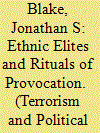

|
|
|
|
|
| Summary/Abstract |
Prominent theories of ethnic conflict argue that instrumental ethnic elites incite violence in order to promote their own power. Yet this approach focuses primarily on political leaders and ignores other ethnic elites, meaning that we know little about how other influential actors think about provocation. In this paper, I present novel data from Northern Ireland on diverse elite attitudes toward polarising Protestant parades with a long history of sparking ethnic violence. Using original surveys of Protestant elected officials and clergy as well as interviews with ex-paramilitaries, this paper demonstrates that these elite groups have different, often competing, interests and opinions regarding contested parades: while politicians tend to support provocative parades, the others do not. By addressing elite actors that are often ignored, I present a more nuanced picture of elite-mass relations and ethnic mobilisation in conflict.
|
|
|
|
|
|
|
|
|
|
|
|
|
|
|
|
| 3 |
ID:
169514
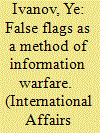

|
|
|
|
|
| Summary/Abstract |
TODAY'S international political competition is largely about states and political groups trying to undermine one another's prestige, and they far from always use peaceful means in doing so. The arsenals that are used in such struggles include false flags - attacks, sometimes causing heavy casualties, that are falsely blamed on their adversariesby those who carry them out.
|
|
|
|
|
|
|
|
|
|
|
|
|
|
|
|
| 4 |
ID:
145142
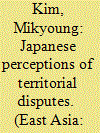

|
|
|
|
|
| Summary/Abstract |
This article examines the causal associations between domestic Japan’s socio-psychological indices and people’s perceptions toward territorial disputes with China and South Korea. The triangulation analyses do not support most of the hypotheses except the explanatory variables of age, level of educational attainment, and Japan’s future projection: The higher the age group, the stronger the territorial sovereignty conviction; the higher the level of education, the weaker the support for the Japanese government’s hawkish policy; and the more pessimistic the future confidence of Japan, the bigger the threat perception of China. The causality could be established only when the probability level was relaxed from 0.05 to 0.10. This research finds a weak overall causal association between domestic state of affairs and territorial perceptions. The public opinion on territorial claims remains more or less the same largely independent of domestic socio-economic conditions. This observation leads to a call to revise the conventional conflict cycle theory (i.e., status quo > provocation > rise of tension > conflict relaxation) in order to reflect more of simultaneous and interactive nature of inter-state conflict (i.e., action [tension/status quo/reconciliation] > reaction [tension/status quo/reconciliation]). The intra-state affairs have become more vulnerable to unexpected and hard-to-control contingencies which defy the procedural progression of conflict management. This implies that the elites can no longer monopolize the decision on foreign affairs.
|
|
|
|
|
|
|
|
|
|
|
|
|
|
|
|
| 5 |
ID:
191055
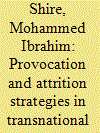

|
|
|
|
|
| Summary/Abstract |
Scholars have identified a range of terrorist strategies that militant groups employ to influence intended audiences, but there is scant empirical validation. Following Kenya’s invasion of Somalia in late 2011, Al-Shabaab executed retaliatory terrorist attacks in Kenya with the strategic aim to compel the withdrawal of Kenyan troops from Somalia. Drawing on unique in-depth interviews with Al-Shabaab defectors and civilian witnesses to counterterrorism measures in Kenya, this article investigates the strategic motives underlying Al-Shabaab’s transnational terrorist operations and assesses the effect these have had on the intended audiences. The empirical findings reveal that the attrition strategy has underpinned Al-Shabaab’s major terrorist attacks (large-scale events) whilst their minor terrorist attacks (small-scale events) have been motivated by the provocation strategy, aimed at eliciting a repressive state overreaction against Kenya’s Somali and Muslim minorities. Whilst the major terrorist attacks succeeded in fomenting the Kenyan public’s anti-war views, this did not result in troop withdrawal; the minor terrorist attacks, however, engendered harsh state repression and draconian measures against Kenya’s Somali and Muslim minorities, ultimately exacerbating existing grievances and channelling fresh recruits to Al-Shabaab. This article contributes to the growing literature on terrorist strategies, offering nuanced empirical insights to understanding the strategic motives underpinning transnational terrorist campaigns. The article demonstrates that transnational terrorism campaigns are rooted in the strategic need to influence different audiences abroad. Depending on militant groups’ short- and long-term objectives, the type of attack indicates the type of terrorist strategy they will employ.
|
|
|
|
|
|
|
|
|
|
|
|
|
|
|
|
| 6 |
ID:
177015
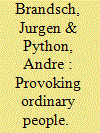

|
|
|
|
|
| Summary/Abstract |
Research on the effects of terrorism mostly focuses on the coercive effects of violence on the macrolevel, while other effects like provocation, particularly on the microlevel, do not receive the same attention. In this article, we seek to address previous omissions. We argue that terrorism can provoke ordinary people into a violent reaction. By reducing perceived security and creating a desire for revenge terrorism may lead civilians to attack uninvolved members of the terrorists’ constituency. Using geo-referenced data on terrorism (Global Terrorism Database) and violent riots (Social Conflict Analysis Database), we assess with a matched wake analysis if the treatment of terrorist violence against civilians causes an increase in violent behavior. The results of our analyses show that terrorism significantly increases violent riots. We thus conclude that terrorism can not only provoke governments but also civilians into an overreaction.
|
|
|
|
|
|
|
|
|
|
|
|
|
|
|
|
| 7 |
ID:
073825
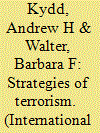

|
|
|
|
|
| Publication |
2006.
|
| Summary/Abstract |
Terrorism is designed to change minds by destroying bodies; it is a form of costly signaling. Terrorists employ five primary strategies of costly signaling: attrition, intimidation, provocation, spoiling, and outbidding. The main targets of persuasion are the enemy and the population that the terrorists hope to represent or control. Terrorists wish to signal that they have the strength and will to impose costs on those who oppose them, and that the enemy and moderate groups on the terrorists' side cannot be trusted and should not be supported. Each strategy works well under certain conditions and poorly under others. State responses to one strategy may be inappropriate for other strategies. In some cases, however, terrorists are pursuing a combination of strategies, and the response must also work well against this combination.
|
|
|
|
|
|
|
|
|
|
|
|
|
|
|
|
|
|
|
|
|